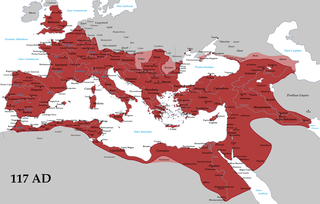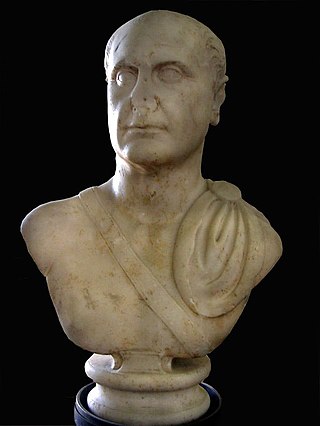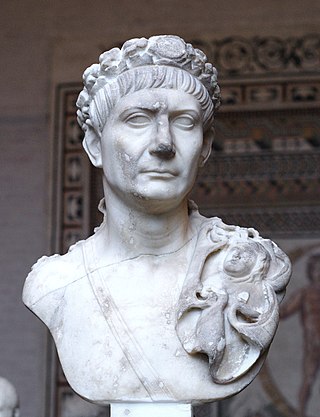Related Research Articles

Hadrian was Roman emperor from 117 to 138. Hadrian was born in Italica, close to modern Seville in Spain, an Italic settlement in Hispania Baetica; his branch of the Aelia gens, the Aeli Hadriani, came from the town of Hadria in eastern Italy. He was a member of the Nerva–Antonine dynasty.

The 110s was a decade that ran from January 1, AD 110, to December 31, AD 119.
Year 118 (CXVIII) was a common year starting on Friday of the Julian calendar. At the time, it was known as the Year of the Consulship of Hadrianus and Fuscus. The denomination 118 for this year has been used since the early medieval period, when the Anno Domini calendar era became the prevalent method in Europe for naming years.
Appius Junius Silanus, whom Cassius Dio calls Gaius Appius Silanus, was consul in AD 28, with Publius Silius Nerva as his colleague. He was accused of majestas, or treason, in AD 32 along with a number of senators, but he and Gaius Calvisius Sabinus were saved by one of the informers, Celsus, a tribune of a city cohort.
Quintus Sosius Senecio was a Roman senator who was favored by the emperors Domitian and Trajan. As a result of this relationship, he was twice ordinary consul, an unusual and prestigious honor: first in 99, with Aulus Cornelius Palma Frontonianus as his colleague; and again in 107 as the colleague of Lucius Licinius Sura, who was himself consul for the third time.
Gaius Bruttius Praesens Lucius Fulvius Rusticus was a Roman senator of the reigns of the emperors Trajan, Hadrian and Antoninus Pius. A friend of Pliny the Younger and Hadrian, he was twice consul, governed provinces, commanded armies and ended his career as Urban prefect of Rome. Bruttius’ life and career left few coherent traces in the literary record, but a number of inscriptions, including his complete cursus honorum, fills out the picture considerably.

Lucius Julius Ursus Servianus was an Iberian Roman politician. He was a prominent public figure in the reigns of Roman emperors Nerva, Trajan and Hadrian. He was the last private citizen to receive a third consulship; such honors came to be reserved for members of the emperor's family.
Sextus Attius Suburanus Aemilianus, commonly abbreviated as Suburanus, was a Roman eques who helped Trajan consolidate his position as emperor. Originally procurator of Gallia Belgica, Suburanus was appointed prefect of the Roman imperial bodyguard, known as the Praetorian Guard, in the year 98 and brought this important military unit under Trajan's control. For his achievement, at the end of his command of the Guard, Suburanus was adlected into the Roman senate inter praetores, then held the suffect consulship as the colleague of the consul posterior Quintus Articuleius Paetus in AD 101.
The gens Calvisia was an ancient Roman family, which first rose to prominence during the final decades of the Republic, and became influential in imperial times. The first of the gens to obtain the consulship was Gaius Calvisius Sabinus in 39 BC.
Lucius Vibius Sabinus was a Roman Senator who lived in the 1st century. His daughter Vibia Sabina married the emperor Hadrian.

The gens Vibia was a plebeian family at ancient Rome. Although individuals named Vibius appear in history during the time of the Second Punic War, no members of this gens are found at Rome until the final century of the Republic. The first of the Vibii to obtain the consulship was Gaius Vibius Pansa in 43 BC, and from then until imperial times the Vibii regularly filled the highest offices of the Roman state. The emperors Trebonianus Gallus and Volusianus each claimed descent from the family.
Gaius Avidius Nigrinus was a Roman senator who lived between the 1st and 2nd centuries. Nigrinus served as suffect consul for the nundinium of April to June 110 with Tiberius Julius Aquila Polemaeanus as his colleague.

The gens Maria was a plebeian family of Rome. Its most celebrated member was Gaius Marius, one of the greatest generals of antiquity, and seven times consul.
Gaius Calvisius Sabinus was a Roman Senator, who was consul in AD 26 as the colleague of Gnaeus Cornelius Lentulus Gaetulicus. During the reign of Caligula, he was accused of conspiring against the emperor, and took his own life rather than submit to a trial.

The gens Ulpia was a Roman family that rose to prominence during the first century AD. The gens is best known from the emperor Marcus Ulpius Trajanus, who reigned from AD 98 to 117. The Thirtieth Legion took its name, Ulpia, in his honor. The city of Serdica, modern day Sofia, was renamed as Ulpia Serdica.
The gens Ummidia was a Roman family which flourished during the first and second centuries. The first member of the gens to achieve prominence was Gaius Ummidius Durmius Quadratus, governor of Syria during the reigns of Claudius and Nero. The Ummidii held several consulships in the second century, and through the marriage of Gaius Ummidius Quadratus Annianus Verus they were related to the emperor Marcus Aurelius.
Aulus Cornelius Palma Frontonianus was a soldier and Roman statesman who was twice consul: first as consul ordinarius in AD 99, with Quintus Sosius Senecio as his colleague; and again in 109, with Publius Calvisius Tullus Ruso as his colleague.
Gaius Calpurnius Piso Crassus Frugi Licinianus was a Roman senator who lived in the 1st and 2nd centuries. He served as suffect consul for the nundinium January to April 87, replacing the emperor Domitian. Crassus is best known for being suspected of plotting against the emperor Nerva, as a result of which he spent much of the rest of his life exiled from Rome to various locations.
Gaius Ummidius Quadratus Sertorius Severus was a Roman senator active during the second century AD. He was suffect consul in absentia for the nundinium of May to June 118 as the colleague of the emperor Hadrian. He is more frequently known by his shorter name, Gaius Ummidius Quadratus; his full name was known only after a missing piece to an inscription from Tomis was found.
Gnaeus Pedanius Fuscus Salinator was a Roman senator and lawyer. He served as ordinary consul for the year 118 AD as the colleague of the Emperor Hadrian. Salinator was a member of the circle of friends and peers around Pliny the Younger.
References
- ↑ Attested by AE 2013, 650
- ↑ W. Eck, G. Paci, and E. P. Serenelli, "Per una nuova edizione dei Fasti Potentini," Picus 23 (2003), pp. 51-108.
- ↑ Dio, 68.16.2
- ↑ Birley, Hadrian: the Restless Emperor (London: Routledge, 1997), p. 67
- ↑ Dio 69.2.5
- 1 2 Vita Hadrianus, 7.2
- ↑ Grainger, Nerva and the Roman Succession Crisis of AD 96-99 (London: Routledge, 2004), pp. 127f
- ↑ Syme, Tacitus (Oxford: Clarendon Press, 1958), p. 648